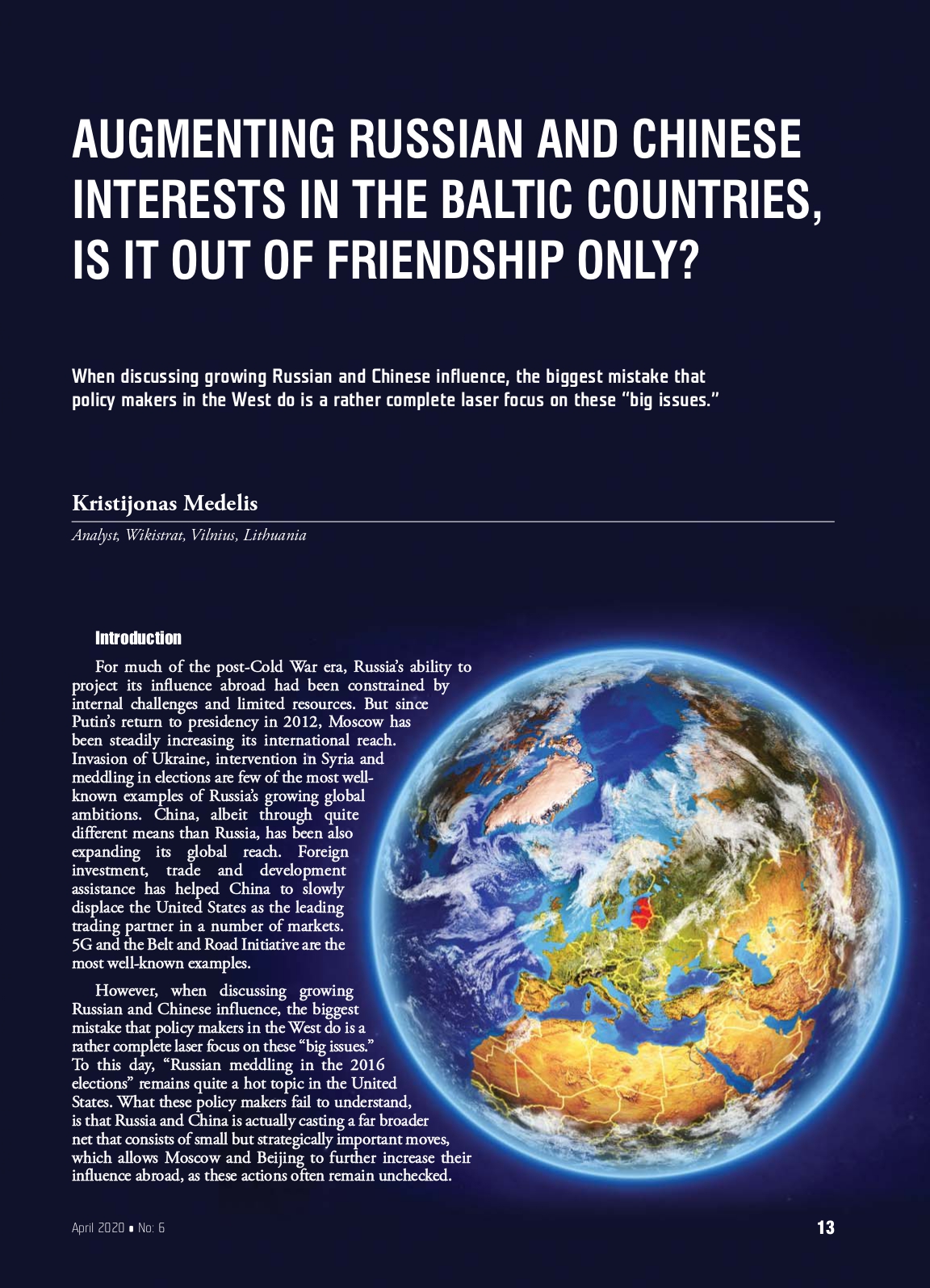
Date of publication: 10 April 2020
Author: Kristijonas Medelis
For much of the post-Cold War era, Russia’s ability to project its influence abroad had been constrained by internal challenges and limited resources. But since Putin’s return to the presidency in 2012, Moscow has been steadily increasing its international reach. Invasion of Ukraine, intervention in Syria and meddling in elections are a few of the most well-known examples of Russia’s growing global ambitions. China, albeit through quite different means than Russia, has been also expanding its global reach. Foreign investment, trade and development assistance has helped China to slowly displace the United States as the leading trading partner in a number of markets. 5G and the Belt and Road Initiative are the most well-known examples. However, when discussing growing Russian and Chinese influence, the biggest mistake that policymakers in the West do is a rather complete laser focus on these “big issues.” To this day, “Russian meddling in the 2016 elections” remains quite a hot topic in the United States. What these policymakers fail to understand, is that Russia and China is actually casting a far broader net that consists of small but strategically important moves, which allows Moscow and Beijing to further increase their influence abroad, as these actions often remain unchecked.
No comments yet.
-
25.01.2016
THE ARMENIAN QUESTION - BASIC KNOWLEDGE AND DOCUMENTATION -
12.06.2024
THE TRUTH WILL OUT -
27.03.2023
RADİKAL ERMENİ UNSURLARCA GERÇEKLEŞTİRİLEN MEZALİMLER VE VANDALİZM -
17.03.2023
PATRIOTISM PERVERTED -
23.02.2023
MEN ARE LIKE THAT -
03.02.2023
BAKÜ-TİFLİS-CEYHAN BORU HATTININ YAŞANAN TARİHİ -
16.12.2022
INTERNATIONAL SCHOLARS ON THE EVENTS OF 1915 -
07.12.2022
FAKE PHOTOS AND THE ARMENIAN PROPAGANDA -
07.12.2022
ERMENİ PROPAGANDASI VE SAHTE RESİMLER -
01.01.2022
A Letter From Japan - Strategically Mum: The Silence of the Armenians -
01.01.2022
Japonya'dan Bir Mektup - Stratejik Suskunluk: Ermenilerin Sessizliği -
03.06.2020
Anastas Mikoyan: Confessions of an Armenian Bolshevik -
08.04.2020
Sovyet Sonrası Ukrayna’da Devlet, Toplum ve Siyaset - Değişen Dinamikler, Dönüşen Kimlikler -
12.06.2018
Ermeni Sorunuyla İlgili İngiliz Belgeleri (1912-1923) - British Documents on Armenian Question (1912-1923) -
02.12.2016
Turkish-Russian Academics: A Historical Study on the Caucasus -
01.07.2016
Gürcistan'daki Müslüman Topluluklar: Azınlık Hakları, Kimlik, Siyaset -
10.03.2016
Armenian Diaspora: Diaspora, State and the Imagination of the Republic of Armenia -
24.01.2016
ERMENİ SORUNU - TEMEL BİLGİ VE BELGELER (2. BASKI)
-
AVİM Conference Hall 24.01.2023
CONFERENCE TITLED “HUNGARY’S PERSPECTIVES ON THE TURKIC WORLD"









